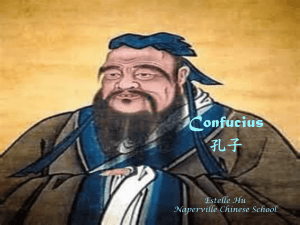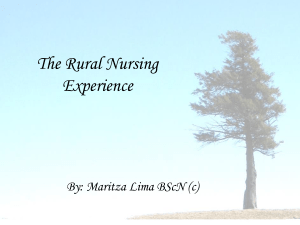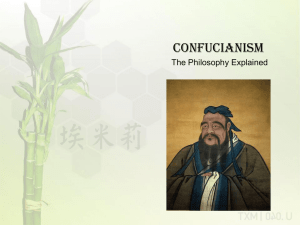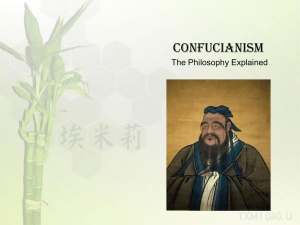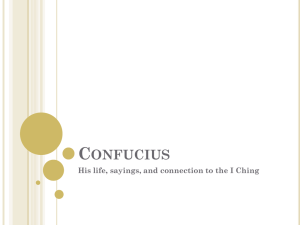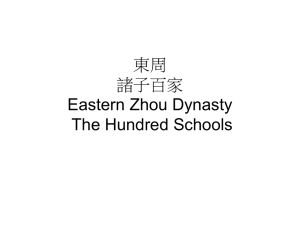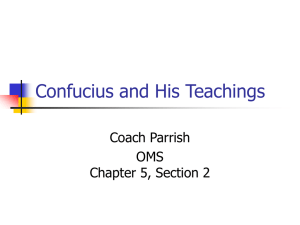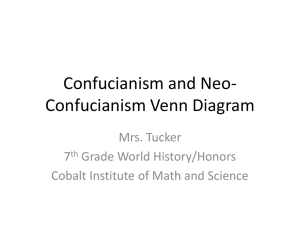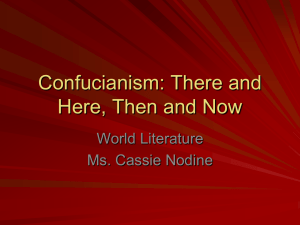Confucianism
advertisement
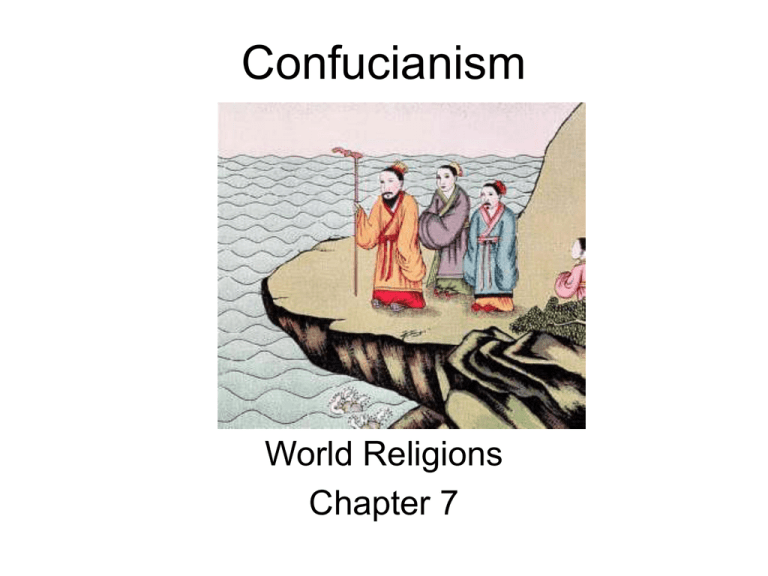
Confucianism World Religions Chapter 7 Kung Fu-tzu (Master Kung – 551 – 479 BC) Is better known as Confucius From an early attempt to render his name in Latin He is one of the most influential people who ever lived Having a vast influence on ¼ of all the world’s population He is known as China’s first teacher The few details about his life make it surprising That he has had such an influence He seemed to be a failure in his life and his career Confucius is born in eastern China And his father dies very soon after his birth. He is raised by his mother And is an exceptional student, studying poetry and history. He becomes a teacher And become fascinated with politics and how the country is governed. At the age of 50 He gains a small post in the duke of Lu’s cabinet But he finds his role is so inconsequential that he quits soon after. The next thirteen years He wanders from state to state trying to put his political theories into practice. He eventually gives up, and comes back to Lu to teach. He dies in Lu In 479 BC at the age of 70. How did this man become so influential? There are several things we can derive from his life and teaching Confucius was gifted with a remarkable strength of character. In the generation after his death His followers put together a collection of his sayings and teachings. This collection, called the Analects, is the main body of his teaching. His personality and character had a huge impact on his disciples And they made sure his wisdom would not be lost. Confucius was a tireless learner and teacher. The Master said: How dare I claim to be a sage or a benevolent man? Perhaps it might be said of me that I learn without flagging and teach without growing weary.” (Analects 7.34) Confucius is also remembered for the brilliance of his ideas What was the context in which he thought and worked? China during the 6th century BC Was a civilization that felt its glory days were passed. Civil strife was the order of the day: Rulers oppressed people, states warred against each other, and society was falling into disarray. Many people were posing solutions to China’s ills There was a group called the Legalists, who wanted a return to strict law and harsh punishments for wrong doers. A teacher named Mo Tzu preached a universal love for all people, including enemies. His followers were called the Mohists. Taoists Taught that the individual quest was most important, and that the individual’s quest to be in harmony with nature is the path towards salvation and happiness. Confucius takes a different approach. His concern is for the health of society, and he focuses on human relationships to help restructure it. He believes in love, but love with justice. He thinks that inspiring examples are more effective in changing behavior than punishment. Confucius looks back on the wisdom of the ancients To teach us how to live ethical lives and how to repair society. Confucius sees himself as a transmitter of the ancient tradition. “I transmit but do not innovate; I am truthful in what I say and devoted to antiquity.” (Analects 7.1) For Confucius, connection to the past was vital for life today. He reinvigorated the tradition of worship of ancestors. Through regular prayer and sacrifice, Ancestor worship helped maintain positive relationships with the dead. This was important because the dead could still impact the welfare of the living. The teachings of Confucius Were interpreted by his followers in the centuries to come. Some stayed very faithful to him, and others innovated his teachings for their time and concerns. For a few centuries, Confucianism was mainly confined to philosophers and teachers. Gradually these philosophers began to influence government officials. In 136 BC a state school of Confucian scholars was founded. Soon all government officials were required to be trained in Confucian thought. Since that time, without interruption, until the beginning of the 20th century All Chinese formal education contained a thorough grounding in Confucianism. The Teachings of Confucius Confucius was dedicated to learning, and he saw learning not merely a gathering of information, but a learning about how to be human. Only by learning this Can we grow into maturity and greater well being. So what does he mean by learning what it means to be human? To do this we must explore the concept of Tao Tao literally means “the Way” In Confucianism, it generally refers to the moral order that permeates the universe. If one can know “the Way” Then it is possible to come into harmony with it. This understanding is vital for Confucius. Confucius devotes much of his teaching to describing the ideal person Chun-Tzu, which translates generally as gentleman. A chun-tzu is a person with perfect moral virtue, And through his or her virtue, contributes to the good of society. “The Master said: The gentleman seeks neither a full belly nor a comfortable home. He is quick in action but cautious in speech. He goes to men possessed of the Way to be put right. Such a man can be described as eager to learn.” (Analects 1.14) Jen, Shu, Li, Wen, Te Confucius stresses many virtues, but several terms can give us special insight into what was important. Jen Jen roughly translates as benevolence, and is the supreme virtue in Confucian thought. “The gentleman never forsakes benevolence, not even for as long as it takes to eat a meal.” (Analects 4.5) This benevolence is shaped by striving to do one’s best at all times And by the concept of shu, which means reciprocity. Shu is close to the golden rule: “Tzu-kung asked: Is there a single word which can be a guide to conduct throughout one’s life? The Master said: It is perhaps the word shu. Do not impose on others what you yourself do not desire.” (Analects 15.24) Yet Confucius does not go as far as Christianity in its “love your enemy.” “Someone said: What do you think of repaying hatred with virtue? Confucius said: In that case what are you going to repay virtue with? Rather, repay hatred with uprightness and repay virtue with virtue.” (Analects 14.36) Confucius’ emphasis on relationship parallels his concern for proper behavior. The moral person will demonstrate their virtue with proper behavior. The term Li Has two meanings: “rite” or “scared ritual” And “propriety” or “behaving properly given the situation at hand.” Confucius, in his study of the traditions of the ancients, Offers a complete guide to Li, a guide to ritual and behavior. A significant aspect of Li is that it does not only refer to sacred or important rituals But to the mundane aspects of life - all work can be done with reverence and attention to detail. Proper behavior is also determined by one’s place or situation: What is the right thing to do with one’s father? Ruler? Friend? Daughter? Learning to be human also requires acquiring a set of important cultural skills: This is known as Wen – the cultural arts. Confucius deeply loved poetry and music And was supposed to be expert at other arts: archery, charioteering, calligraphy, mathematics. Learning the traditional arts is a way of growing as a human being: And as one grows in the arts, one contributes to society. Confucius believes that human beings learn best from the power of positive example: This is called Te. Te means virtue shown through the power of example. Confucius deemed this as a much more effective means of leadership than punishment and law. The Five Constant Relationships Confucius is concerned with harmony between human relationships. The self, the family, the nation, and all humanity are linked in a web of relationships. “Love between father and son, duty between ruler and subject, distinction between husband and wife, precedence of old over the young, and faith between friends.” Self Confucius does not understand the self as an isolated individual – as in the West – but the self discovers its identity in the context of relationships. Who I am is Son, daughter, mothers, father, subject, ruler, wife, husband, friend, etc. The individual is not static, But is in a constant process of self-cultivation, engaging in the work of relationships to deepen our sense of who we are. Family is central to Confucius, And especially duty to the elders in our family. This is something that Western people Can learn much from, especially in the modern context where age is seen as a burden and not a source of wisdom. Confucius taught that in every context, respect for the parent and elder is more important than being right or disproving them. However, duty can have its problems: Should a wife be dutiful to an abusive husband? Should children be kind to a cruel father? The Nation Confucius thought that those who govern would be much more effective if they followed his notion of Te. One leader asked him: Why not just kill those who do not follow the Tao? Confucius answered: In administering your government, what need is there for you to kill? Just desire the good yourself and the common people will be good. The virtue of the chun-tzu is like the wind; the virtue of the small man is like grass. Let the wind blow over the grass and it is sure to bend. (Analects 12.19) Confucius says little regarding divinity or afterlife, But just because he is largely silent about them does not mean he did not think of them. “Heaven is the author of the virtue that is in me.” (Analects 7.23) Confucius’ harmony of relationships seemed to also extend to the Heaven: While Heaven provided the moral order, Heaven is also impacted by and partially dependent on human society. The working of the human world impacts Heaven. Confucianism is unique in world religions in this regard. Legacy Communist governments in China and Korea have outlawed the practice of all religions, and the influence of western culture poses a challenge to traditional ways of life. However, the depth of impact of Confucius on these cultures, Especially the importance of family, will not diminish completely. The teachings of Confucius Also have much to offer the West, with its seeming lack of traditional life and loss of direction in many of the social challenges it faces. Confucius dug deeply into the tradition of the ancients And his wisdom is still a gift to humans today.

